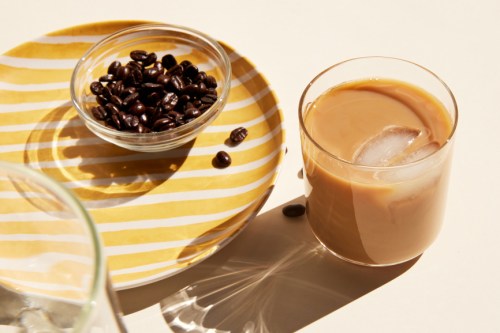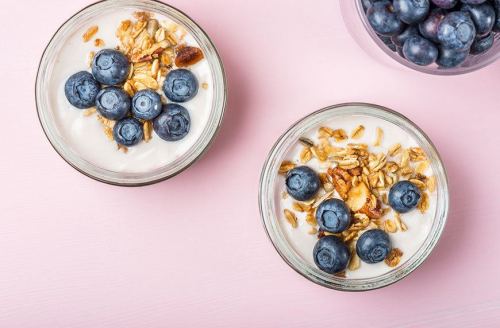While an early morning pit stop at Starbucks is a nonnegotiable for many of us, we don’t always get the opportunity to speak with the masterminds behind the counter to ask them why (and how!) their drinks always taste so darn good. Is it the fancy equipment? That extra pump of vanilla? Or the incredibly consistent flavor of their coffee beans?
Experts in This Article
Perhaps it’s a combination of all of these elements. However, John Brockman, the director of equipment development at Starbucks, says there also might be something in the water… literally. Brockman—who has over 15 years of experience in the development, design, and implementation of water systems at Starbucks globally—tells us how different types of water impact a coffee’s flavor profile, plus which type is the best water for coffee when you’re making it at home.
How different types of water impact a cup of coffee
Leave it to the quality assurance team to ensure that no matter which of Starbucks’ 35,000 stores you visit worldwide, your go-to order will taste nearly the same. That said, this certainly isn’t an easy feat. According to Brockman, there are many factors the Starbucks team takes into account to ensure consistency in a cup of joe throughout all of their stores. One of the biggest hurdles? The vast differences in the water supply across all regions.
Many folks find water to be virtually tasteless, but Christina Li, a water sommelier based in Canada, begs to differ. “For a water sommelier, we find that the different mineral content will give you a very different taste and sensation on the palate,” Li previously shared with Well+Good.
To that end, Brockman agrees that these nuances can easily define how a cup of coffee tastes. “Each community throughout the world has a unique water supply. Starbucks expert coffee tasters, or Q graders, have found that the harder [i.e. higher mineral content] the water is, the more muted the coffee flavors and aromas will be. Softer water has fewer minerals and is less alkaline, generally making it better for brewing coffee,” Brockman says.
“Starbucks expert coffee tasters, or Q graders, have found that the harder [i.e. higher mineral content] the water is, the more muted the coffee flavors and aromas will be. Softer water has fewer minerals and is less alkaline, generally making it better for brewing coffee,” Brockman says.
So, how does Starbucks ensure that all of the water used to craft their coffee drinks contains the same amount (or lack thereof) of minerals? The answer is crystal clear: Establishing very meticulous benchmarks to meet the same standards worldwide. “Starbucks has many benchmark measurements, including the ones you mention, [hardness, pH levels, filtration, mineral content], to assess the quality of water for coffee. No matter how coffee is brewed, we use the same benchmark measurements to ensure consistent quality across brewing methods,” Brockman says.
This is accomplished by specialized water filtration methods—aka Brockman’s bread and butter. “Each Starbucks store has a custom water filtration system that’s designed to perfect the local water for brewing coffee. We test the water across stores to determine the exact filtration needed for our baristas to craft the high-quality cup of Starbucks coffee that is served in our stores,” he says.
So, what’s the best water for brewing coffee at home?
Of course, many of us don’t have the fancy equipment (like at a Starbucks store) to test the water quality. So, one easy workaround Brockman suggests is always using filtered water to establish some sort of benchmark from the comfort of your home. “When brewing coffee at home, filtered water is best. Using a filter with activated carbon, whether from a water filter pitcher or an in-home water filtration system, ensures you are starting with the most optimal water to brew the best-tasting cup of coffee at home,” he says.
“When brewing coffee at home, filtered water is best. Using a filter with activated carbon, whether from a water filter pitcher or an in-home water filtration system, ensures you are starting with the most optimal water to brew the best-tasting cup of coffee at home.”
TL;DR? The type of water used to make coffee can, in fact, significantly alter its flavor. So, whenever in doubt, use filtered water, a Starbucks coffee pro explains. “Think of water like a sponge; if it’s already full of minerals, it’s less able to pull something out of what it touches. To brew a nuanced and flavorful cup of coffee at home that tastes like the one you get from a Starbucks store, you want to make sure you are starting with filtered water for the best cup of coffee,” Brockman says.
Learn the many benefits of drinking coffee, according to a registered dietitian:
Sign Up for Our Daily Newsletter
Get all the latest in wellness, trends, food, fitness, beauty, and more delivered right to your inbox.
Got it, you've been added to our email list.










